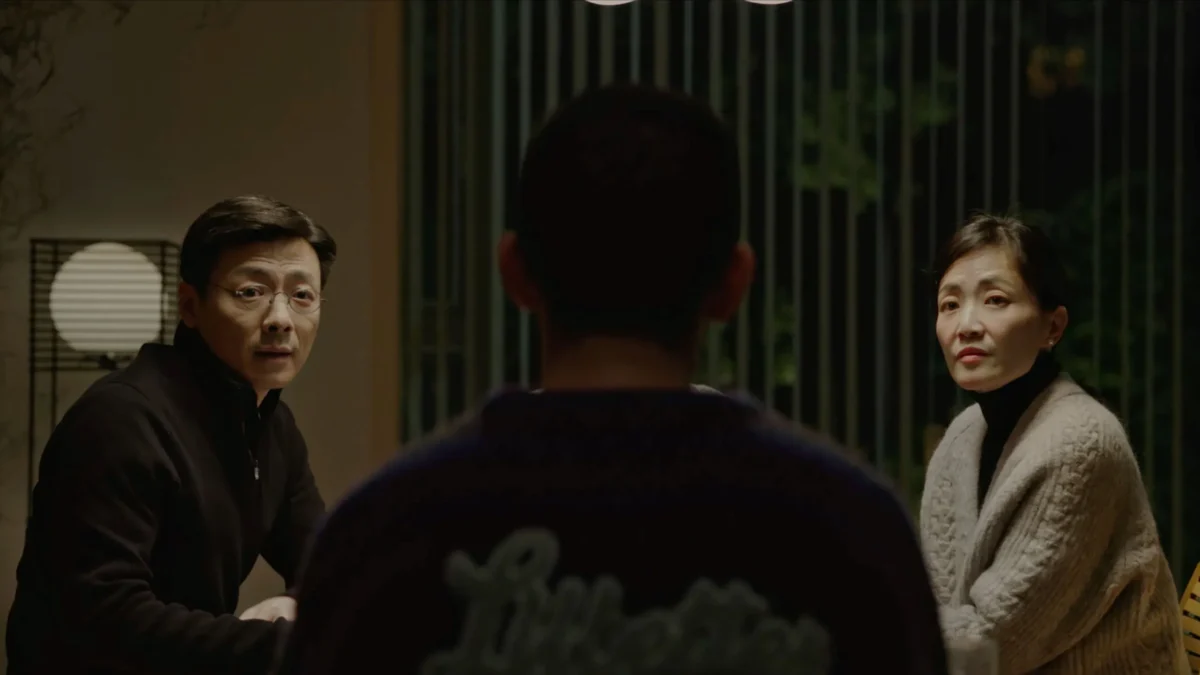A school accident brings Shuo, an only child, to the attention of Wei, another only child. Avoidant of anything beyond the challenges found in video games, Wei sees in the introverted and somewhat affection-deprived Shuo a convenient distraction, or simply someone to keep his mother away from his console.
While Wei remains spellbound by his screen, Shuo, studious and unusually articulate for his age, comes to embody the ideal son: polite, promising, and in need of care. He slips easily into the space left vacant by Wei’s inch-perfect parents, who manage everything except their teenage child. Shuo is entering the family.
“Brief History of a Family” (Original title: Jiating jianshi, 2024) moves with the rhythm of a psychological mystery, a thriller that never quite escalates. Drawing from the clean, sterile aesthetic of its genre, Lin Jianjie delivers a sculpted debut, primarily preoccupied with light, framing, and cinematic references.
Beyond its visual control, the film isn’t invested in character psychology; rather, it presents four distinct portraits of individuals shaped by the long shadow of China’s one-child policy. That policy is mentioned only twice (technically once, as a Mandarin-speaking friend pointed out, the English subtitles are more explicit than the original dialogue).
In this context, the emotional dynamics of child-rearing appear less like choices and more like circumstantial constructions, deeply tied to state regulations and societal ideals. It’s a missed opportunity that the film only briefly touches on the perception of children as a future workforce, though the performances (Sun Xilun, Lin Muran, Feng Zu, Guo Keyu) carry the emotional weight of that implication.
There’s no doubt that Jianjie, with his first feature, aimed to craft something lasting. And in many moments, he succeeds. The details of a carefully regulated society are rendered with sensitivity. The mother, fluent in English thanks to her career, shares solo travel photos from a freer past. The father, convinced that his son’s success lies elsewhere but not here, carries a solid educational plan that is caught between obsessions and anxieties.
The film’s most compelling thread lies in the ambiguity around Shuo’s past. Like the family, we’re tempted to believe in his story of escape from an abusive home, yet little is offered to affirm or dispel that trust. Despite subtle cues about Shuo’s manipulative streak, the film relies heavily on the viewer’s ability to intuit the evolving bonds between the four characters.

In its critique of the futures carved out for individuals in “perfect” societies, the film maintains a composed, symmetrical image. The framing, precise, still, and often centered, quietly asserts its point of view. Shifts in perspective place the viewer at the family table, mirroring the film’s exploration of individuality within such control. But this composure falters when it turns most confidently: to humor.
Laconically witty scenes, striking when isolated, are poorly placed and undermine their competence in illustrating characters’ psyches and the overall pacing. Similarly, screen recordings or microscope images that appear sporadically lack grounding, betraying a kind of effortful symbolism. One wonders whether these were creative choices or signs of industry-driven compromise.
Anyhow, and most importantly, for a story that delves into class differences and personal suffocation under the strict societal eye, “Brief History of a Family” is contextually confused. That said, comparisons are inevitable. Bong Joon-ho’s “Parasite” is a lingering omen, given its slow-burn infiltration into a family structure and the shared emphasis on class tension. Kiyoshi Kurosawa’s “Chime,” on the other hand, comes too often to mind for its spatial confinement and emotional pressure within the household, qualities that feel particularly resonant in the Chinese context (even with a dash of exaggeration for the sake of the discussion).
Yet the film’s stylization (in both image and narrative progression) leans closer to European cinematography, especially to that of Yorgos Lanthimos. “The Killing of a Sacred Deer” remained at the back of my mind while watching, for direct plot parallels if you like, but also for how both films isolate affect through rigid formality and emotional detachment.
Perhaps the influence of the international co-production, and in particular of the Danish editor Per K. Kirkegaard and composer Toke Brorson Odin, was a pinch too assertive. Despite its craft and the solid and enduring theme, “Brief History of a Family” will likely remain adrift in a sea of overworked precision and familiar gestures.
“Brief History of a Family” premiered in competition at Sundance 2024, followed by a global festival run (including the Beijing International Film Festival) and limited theatrical releases worldwide. The film is scheduled for theatrical release this August in France and the Netherlands.

![The Swallows Of Kabul [2019]: Cannes Review](https://79468c92.delivery.rocketcdn.me/wp-content/uploads/2019/05/The-Swallows-Of-Kabul-Cannes-High-On-Films-768x415.jpeg)
![Vampires [1998] Review: Style. Swag. Savagery.](https://79468c92.delivery.rocketcdn.me/wp-content/uploads/2019/09/vampires-cover-1-768x432.jpg)
![Pity [2018]: ‘Sundance’ Review](https://79468c92.delivery.rocketcdn.me/wp-content/uploads/2018/01/Pity_Sundance_HOF-768x415.jpeg)

![Spider-Man: No Way Home [2021] Review – A Tale of Two Movies At Odds With Each Other](https://79468c92.delivery.rocketcdn.me/wp-content/uploads/2021/12/Spider-Man-No-Way-Home-2021-e1639643826956-768x397.jpg)
